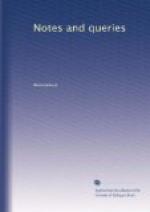It is perfectly true that the writing of the MS. which has given rise to these queries and remarks is small, full of contradictions, and sometimes difficult to be read; but the contractions are tolerably uniform and consistent, which, to those who have to do with such matters, is proved to be no inconsiderable encouragement and assistance. A more serious difficulty arises from the circumstance, that the bookselller used more than one language, and none always correctly. Still it may be presumed he was not so ignorant as to make a blunder in spelling his own name. And the first words of the manuscript are these: “+In nomine domini amen ego Johannes dorne, &c. &c.” (In noie domi ame ego Johanes dorne, &c.) From the inspection of a close copy now lying before me, in which all the abbreviations are retained, and from my own clear recollection, I am enabled to state that, to my full belief, the name of “dorne” is written by the man himself in letters at length, without any contraction whatever; and that the altered form of it, “Domr,” as applied to that particular person, exists nowhere whatever, except in page 75. of No. 5 of the “NOTES AND QUERIES.”
The words “henno rusticus” (heno rusticus) are found twice, and are tolerably clearly written in both cases. Of the “rusticus” nothing need be said; but the first n in “henno” is expressed by a contraction, which in the MS. very commonly denotes that letter, and sometimes the final m. How frequently it represents n may be judged from the fact that in the few words already quoted, the final n in “amen,” and the first in “Johannes,” are supplied by it. So that {89} we have to choose between “henno” and “hemno” rusticus (rather a clown than a gentleman, whatever was his name; and perhaps the treatise, if ever found, will prove to treat merely on rural affairs). And although it may turn out to be perfectly true that “homo rusticus” was the thing meant, as your correspondent suggests, still that is not the question at issue; but rather, amidst the confusion of tongues and ideas which seems to have possessed poor Dorne’s brain, what he actually wrote, rather than what he should have written.
Admitting, however, for supposition’s sake, that your correspondent is right, that the man was named Dormer, and the book Homo rusticus—is there any one who will obligingly favour me with information respecting these, or either of them?
One word more, and I have done; though perhaps you will think that too much has been said already upon a subject not of general interest; and indeed I cannot but feel this, as well as how painful it is to differ, even in opinion, with one towards whom nothing can be due from me but respect and affection. But the direct inference from your correspondent’s remarks (although it is fully my persuasion he neither designed nor observed it) is, that my difficulties are no difficulties at all, but mistakes. To




